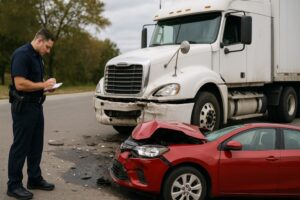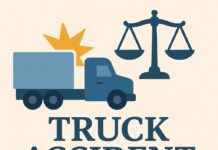
If you’ve been in a crash involving a car or a truck, there’s a lot to deal with. Between the stress, damage, and confusion, it’s easy to feel overwhelmed. But the steps you take immediately after the accident and in the days that follow can make a big difference, especially when it comes to making a claim.
Whether you were driving a small vehicle or involved in a collision with a large truck, the process can be complex. Here’s what you need to know to protect yourself and make sure your claim is handled properly.
The First Steps Matter More Than You Think
Right after the accident, your actions will shape how your claim plays out. It’s not just about safety, it’s also about protecting your rights.
Here’s what you should always do at the scene:
- Call the police – Even for minor crashes. You’ll need an official report later.
- Check for injuries – Get medical help if anyone is hurt, including yourself.
- Gather evidence – Photos of the scene, damage, road signs, skid marks, and weather conditions can help later.
- Exchange details – Get names, license numbers, insurance info, and contact details from everyone involved.
- Speak carefully – Don’t admit fault or guess what happened. Just give honest, basic facts.
If the other vehicle is a commercial truck, be sure to also note the company name on the truck, the truck’s license plate, and any identifying numbers on the vehicle. Truck accidents can involve more parties than just the driver.
Car vs. Truck Accidents: What’s the Difference?
While the general process of making a claim is similar, truck accidents come with a few extra layers. These aren’t your typical fender benders.
Here’s how truck accident claims differ:
More serious damage
Trucks are heavier, which usually means greater impact and more severe injuries.
Multiple parties involved
You may have to deal with the truck driver, the company that owns the truck, their insurance provider, and sometimes even the truck’s manufacturer or a third-party maintenance company.
Tighter regulations
Truck drivers and companies must follow strict rules around driving hours, maintenance, and load weight. If any of these were violated, it can support your claim.
More evidence to secure
In addition to typical crash photos and police reports, you may need black box data, driving logs, and company records.
Because of this, truck accident claims often take longer and may involve more back-and-forth.
Who Was At Fault?
Fault plays a big role in how much compensation you can receive, and companies like Angel Reyes & Associates can shed light on this. Insurance companies will examine every piece of evidence to figure out who caused the accident and who should pay. If both parties share some blame, your payout might be reduced based on your level of responsibility.
For truck accidents, fault can be harder to pinpoint. Was it the driver’s mistake? A mechanical failure? Did the company ignore safety issues? These questions need careful investigation.
Even in car-on-car accidents, don’t assume the story will be clear-cut. That’s why documentation matters so much, especially if your memory of the crash gets hazy later.
What to Expect When Filing a Claim
Once you’ve reported the accident and filed a claim, the process officially begins. But it’s rarely quick and simple. Here’s how it usually goes:
- Claim is opened – After you contact the insurance company, they’ll assign someone to your case.
- Investigation starts – The adjuster will review police reports, statements, and damage. In truck cases, they may look at trucking records too.
- You’ll be asked for documents – These might include repair estimates, medical bills, proof of lost income, and other records.
- Determination of fault – Based on the evidence, the adjuster will decide who was at fault and to what degree.
- Settlement offer – If your truck accident claim is approved, you’ll get a proposed payment. You don’t have to accept it right away.
It’s common for the first offer to be lower than expected. You’re allowed to negotiate, especially if your damages or injuries were significant.
The Most Common Mistakes People Make
A few simple errors can cost you time, money, and peace of mind. Try to avoid these:
- Delaying medical treatment – Waiting too long to get checked can weaken your claim. Insurers may say your injuries weren’t serious or weren’t caused by the crash.
- Not following up – If you don’t respond to calls or miss paperwork deadlines, your claim may stall or even close.
- Underestimating damage – Some injuries take time to show. Some car damage is hidden under the surface. Don’t rush to close your claim until everything has been properly checked.
- Giving recorded statements too early – Insurance companies might use your words against you. You can decline until you’re ready or have guidance.
- Posting on social media – Anything you say publicly could be used as evidence. It’s safer to stay quiet online until your claim is settled.
What You Might Be Entitled To
The exact amount depends on the situation, but common parts of a settlement may include:
- Repair or replacement of your vehicle
- Medical expenses – both immediate and ongoing care
- Lost income if you missed work
- Pain and suffering for physical or emotional stress
- Rental car costs if your vehicle is out of commission
- Future expenses – sometimes injuries create long-term issues that require more care down the road
Truck accidents especially can result in higher payouts, simply because the damage and injuries are often more severe. But with that comes a more complicated process.
When Things Get Complicated
Not all claims go smoothly. If fault is disputed, if multiple parties are involved, or if your injuries are serious, the process may drag out. Insurance companies are not quick to hand over large sums, and they may challenge every detail.
In these cases, the support of someone experienced in navigating accident claims can be helpful. Especially if you’re dealing with a trucking company, don’t assume they’ll make things easy.
You may need extra documentation, expert opinions, or even legal action to get a fair result.
Take Control Early
Getting into an accident, whether with another car or a large truck, can turn your life upside down in minutes. But you’re not powerless in the aftermath.
Start strong, gather everything you can, and don’t rush through the claims process. The more informed and prepared you are, the better your chances of getting what you deserve. A good claim is built from day one — not just with paperwork, but with careful choices and clear records.
Small steps early can make a big difference later.







